School Work: A discipline master who uses his police officer experience to teach children right from wrong
In the second part of a series where CNA reporters shadow various school professionals for a day, a discipline master at Yuhua Primary School shows what it means to him to care for children - and who is a far cry from the type of discipline master many people might remember.
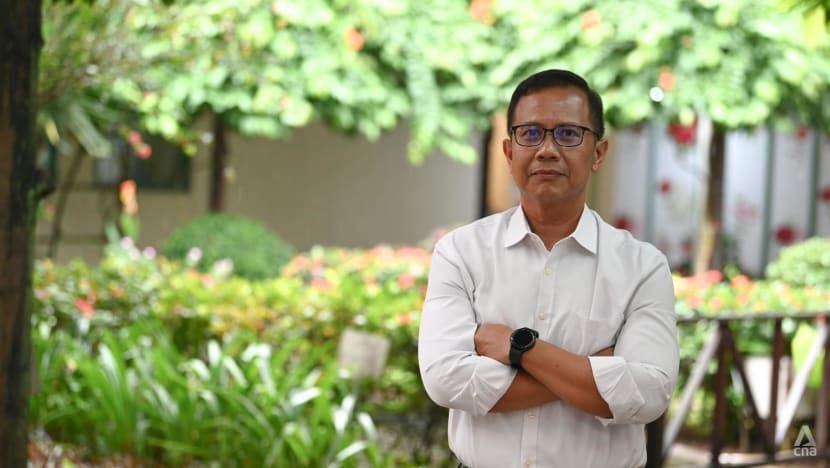
Mr Musa has been a discipline master in Yuhua Primary School since 2007. (Photo: CNA/Hanidah Amin)
SINGAPORE: It is still dark when the first school bus pulls up to Yuhua Primary School at 6.30am, its loud rattling noise breaking the early morning silence.
One-by-one, children decked in red and blue chequered uniform hop out of the bus, clutching the straps of their backpacks.
As they make a beeline for the canteen, the school’s discipline master Musa Abdul Kadir comes into view, smiling warmly at them.
“Good morning, children! Welcome back to school,” says Mr Musa, repeating the greeting every few seconds as the students stream pass him.
Some chirp a greeting back while others simply bow their heads out of respect or wave back shyly.
More buses arrive and soon he is surrounded by a group of students, trying his best to keep up with them as they talk over each other excitedly.
Above the chatter, one boy could be heard saying: “Mr Musa, have you seen my YouTube video? I make Legos in it!”
Another shows him his new black jacket, beaming proudly when he receives a thumbs-up from Mr Musa.
As this reporter watched the children rush up to Mr Musa, I was surprised. It was a far cry from my own experience back when I was a young student.
My discipline mistress in primary school was a fearsome woman, whose stare was enough to make me quiver in fear - even if I hadn’t done anything wrong.
I recall morning assembly being exceptionally nerve-wrecking, as she prowled around the parade square, her sharp eyes quick to catch misbehaving students.
Back then, avoiding the discipline mistress was not only "the thing to do", it was a matter of survival.
Going up to chat with her was more likely to end up with a warning about how socks were supposed to be above the ankles or how hair should not be below the eyebrows, rather than a casual conversation about our day.
But the latter is exactly what Mr Musa hopes to do.
While each exchange is no more than a few minutes long, the 51-year-old believes that it goes a long way, especially when it comes to instilling positive behaviour in children.
“To discipline is to care and so, as much as possible, I try to find time to touch base with students just to show them that they are valued and welcomed in school,” said Mr Musa, who is also a Head of Department (HOD) overseeing student management, discipline, and student leadership.

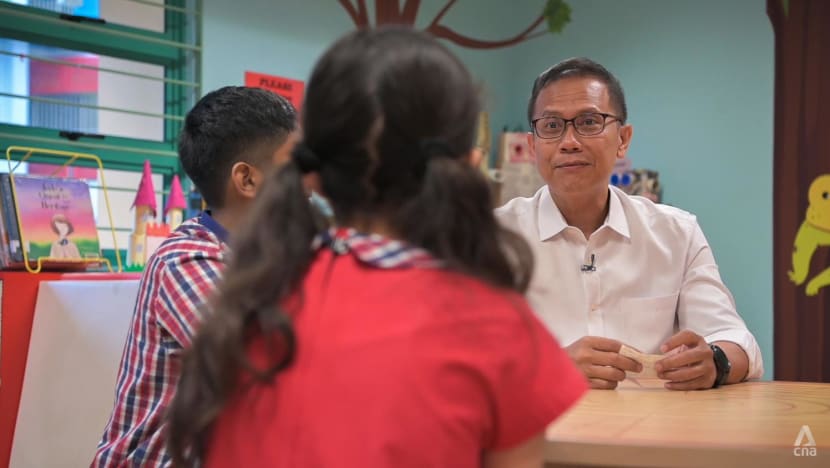
He told CNA that he tries to build relationships with students who may require more attention, such as those who display negative behaviour at school.
“We put in extra effort for certain groups of students so that if and when things do happen, we already have a relationship with the child and they know that we’re meting out consequences because we care and love them,” he said.
It has been nearly two decades since the former policeman decided to hang up his uniform for a career in teaching, but the lessons he learnt from his experience in law enforcement remain relevant in his current job.
“Listening and communicating with people, investigating things and looking out for little details here and there, these are the skills that I gleaned from my experience in the police force,” he said.
“As a discipline master, those skills come in handy because children, being children, may not be very coherent when they tell you what happened, so you need to be able to link the dots.”
“It's amazing what we can understand if we just be patient, listen to the children and give them a voice. Sometimes, what is not said is as important as what is being said,” he added.

Sharing his experience in dealing with a student who regularly skips school, he said he had kept a look out for the boy every day until he finally showed up.
However, instead of confronting the boy about his poor attendance, he decided to give him something to do instead.
Noticing that the student usually arrived in school early, he assigned him the role of a peer support leader, which involves looking out for other children and reminding them to do silent reading before morning assembly.
His plan worked and the student’s attendance rate began to improve.
“He feels motivated and likes the recognition,” said Mr Musa. “His attendance is improving but is not perfect yet as there are other challenges that he needs to overcome, which are beyond his control.”
“But by giving him some responsibility, I try to make him feel valued here,” he added.
TO SPARE THE ROD OR NOT
As CNA followed Mr Musa during his rounds to check on students in classrooms, almost, if not all, students appeared to be on their best behaviour.
Some waved to him as he walked past, but most kept their eyes on the teacher in front, paying attention to the lesson.
“The students are generally very well-behaved,” said Mr Musa. “They know what is expected of them and they put in effort to do the right thing.”
This is due to the significant work that goes into nurturing students and promoting good behaviour in the classroom, he said.
However, he acknowledged that there will be times where students who misbehave have to face the consequences.
“In a class of 30 to 40, things may happen and that’s where teachers will need to address those behaviours promptly and correct them,” he said, adding that this may include warnings or interventions by teachers.
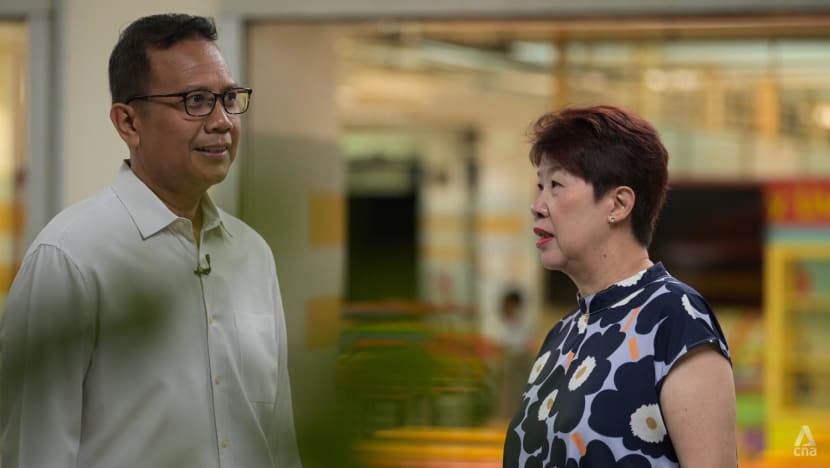
In cases where a serious offence is committed, the school might even consider caning as an appropriate consequence, he said.
Caning, as a form of corporal punishment in schools, is allowed under the Education (Schools) Regulation. However, under current legislation, no corporal punishment can be administered to girls.
As for male students, the regulation states that this “shall be administered with a light cane on the palms of the hands or on the buttocks over the clothing”.
No other form of corporal punishment is allowed.
Mr Musa shared that over the years he has had to cane a “handful of students”, but did not elaborate on the offences committed.
He added that this was done after much deliberation and consultation with school leaders and the students’ teachers.
“It is only when we feel that caning is a consequence that is appropriate and is logical that we will mete out the caning,” he explained.
“Caning is not the end, it’s the means to an end because after the caning, we have to ensure that the child's well-being is looked into and that is important. It is part of the process of teaching the child to make better decisions.”
“Those children who I have caned because of mistakes that they made, I'm heartened to see them coming back during Teacher’s Day and they remember exactly what happened," he said.
"They are thankful and grateful because to them, it was an opportunity for them to learn,” he added.
CHALLENGES IN DISCIPLINING TODAY
However, with children having greater access to social media today, Mr Musa is venturing into uncharted waters.
“In the past, if we had a case of bullying in the school, we would manage it in school and part of that process would be to make both parties apologise and work on restoring their relationship,” said the 51-year-old, who was first appointed as the school’s discipline master 16 years ago.
“But now, when bullying happens, especially in cyberspace, things may not be resolved very easily or quickly.”
“We can do all the intervention in school but even if we ask the children to delete their account or whatever content they posted, we can never be too sure whether it’s really gone and that's something that worries me.”
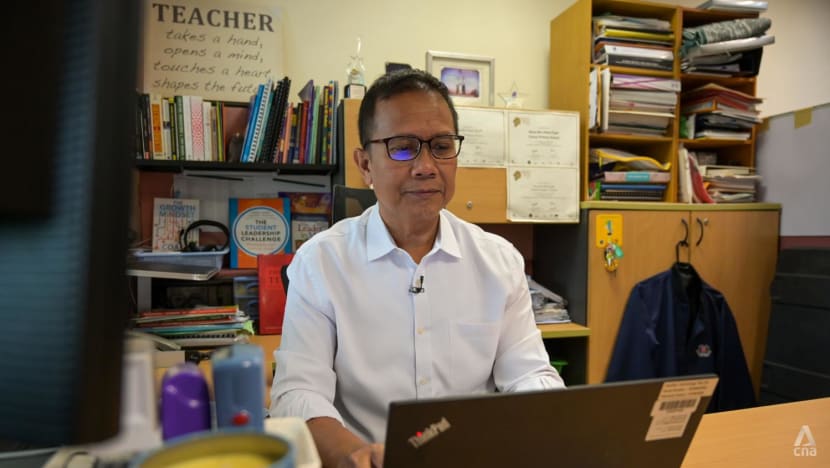
To tackle this, the school educates students on the proper use of digital platforms and tries to equip them with skills such as how to look out for signs of cyberbullying. This is typically done through the formal curriculum and assembly talks.
“Most of the time, the children are using the Internet or their mobile devices away from the eyes of parents and teachers, and so we may not be there to tell them not to do something,” he said.
“By teaching our students how to be upstanders and not bystanders, they can help to keep an eye on their friends, so that when something goes wrong online, they can make it stop or if they can’t, they can report the matter to a teacher, who would be in the position to do something about it.”
BEING A CHAMPION
Nearly two decades on, Mr Musa still finds meaning in his work and enjoys working with children.
But what is especially rewarding, he said, is seeing students whose behaviour improves over time.
Recounting a former student who used to be very rowdy and aggressive, he said he had worked closely with his colleagues to help the child.
“When he first came into the school, he was stepping on teachers’ feet, pushing them away and at one point, he even spat at some teachers but we recognised that the child needed time to learn,” he said, adding that the child had special needs and did not come from a positive environment.
“My colleagues and I got together and we put in the intervention that was necessary for the child. The change didn’t happen overnight but by the time he reached Primary 5, we could see a very drastic turn around,” said Mr Musa.
"He became one of the best behaved student in the class.”
“When he left the school after Primary 6, the teachers were so proud of him because of the journey that he went through with us,” he said, smiling at the memory.
“It just goes to show that it takes a whole village to really make that impact on the child and as a discipline master, I recognise that I can create a big impression on a children, so I don't take this responsibility lightly.”
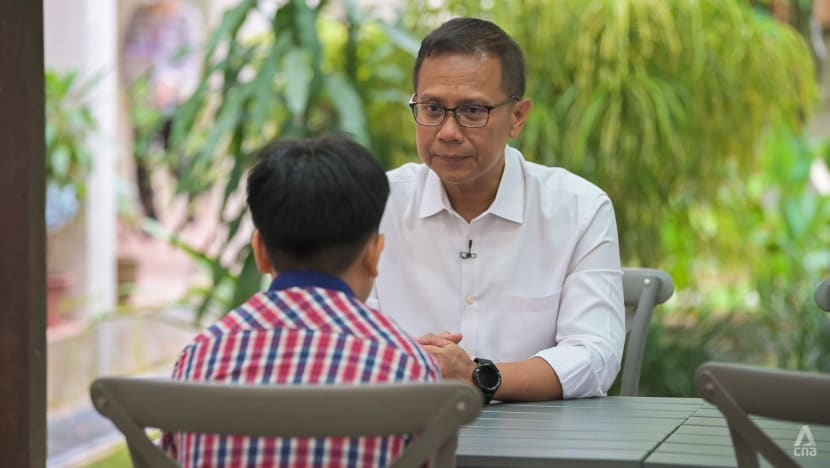
As the school day came to an end, this journalist was getting ready to leave when I suddenly thought of the student who had asked Mr Musa to watch his YouTube video in the morning.
Throughout the day while I shadowed Mr Musa, the boy had come up at least three times to ask if the teacher could watch his videos.
Curious, I searched for his channel and pressed play. The videos - five in total - all featured the boy proudly showcasing his Lego creations.
When I told Mr Musa that I had watched the boy's efforts, he grew excited.
“Can you wait a while? Let me go get him so that you can tell him you watched his videos. It would mean so much to him!” he exclaimed, before dashing out of the conference room to find the student.
Fifteen minutes later, he returned to the room alone, his forehead beaded with sweat from running around the school.
The student was currently in a class so he could not come, he said.
While I did not get to see the child’s reaction, that particular incident was a testament to the lengths Mr Musa would go, just to make his students feel valued.
When asked what his favourite part of the job was, his answer is simple: “I get to be a champion for children who need one.”














